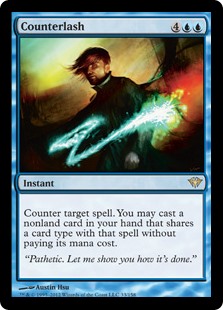Not everyone likes counterspells.
This is an oft-used refrain by many players who go up against Blue decks specializing in disrupting their enemy’s chances of winning by negating their most timely and powerful spells. It’s the Magic equivalent of just saying, “Nope”, with little anything that player can do about it. Counters are prevalent in most Magic sets, are an efficient means of slowing your opponent down, are limited almost exclusively to one single color, and the act of having your card and mana completely nullified in front of you can lead to some stinging moments.
Every color does specific things that are painful for the rest to deal with, but to many counters are one of the most, be it tactically, emotionally, or psychologically.
To a Blue mage though, they’re just another tool in the toolbox.
That said, there are counters and then there are counters. There are debates between soft (taxing) counters versus hard counters. There are weighted discussions between the merit of counters that only work on subsets of cards. There are valued arguments over whether decks around straight denial are even that viable outside of all but the oldest formats. Yet if you ask most counter-focused Blue players, the one cardinal rule they all adhere to is that expensive counterspells are a big no-no.
Seriously, among the most ardent control crowd, there is a strident distaste for three mana counterspells unless it has some kind of potent kicker. For them, classic cards like Counterspell and Mana Leak will always be preferred over something so derivative as Cancel. So something like Lay Bare? Countermand? Controvert? Perish the thought. Perhaps in Limited, but never in ‘serious’ gameplay.
So, naturally, Counterspells above four mana would be akin to a Blue mage intentionally trying to lose. Or so the logic goes.
In the casual sphere, that knee-jerk reaction to a counterspell’s CMC has always been a tiny bit more forgiving. Among the more laid-back formats, especially multiplayer ones, three mana counters are perfectly acceptable, and flashier, costlier counters are also acceptable in moderation. One of the earliest examples of this, Desertion, was even used regularly enough to warrant reprints. But do you know one of the most memorable 4+ counterspells within the casual multiplayer crowd for quite some time? Judgment’s Spelljack.
Spelljack wasn’t your normal counterspell. Costing a whopping six mana, not only is it an unrestricted counter, but similar to Desertion, it quite literally steals your opponent’s spell in the process. Then it goes one step further and allows you to sit on that spell and free cast it at any later point in the game.
As counters go, Spelljack is the epitome of a one-two punch, as it both robs your opponent of a potent spell and allows you to use their own resources against them later on.
Of course, Spelljack has two minor areas of fragility. First, it requires sitting on six mana and hoping you have enough open at the time to use it. Second, to feel like you’re getting the best use of said card, you want to ensure you counter something meaningful. You don’t want to feel like it’s being wasted on something inconsequential. No, you want to steal something game-changing – or even game-ending. But you may not always have the means or desire to wait for just the right moment. Which means that Spelljack’s secondary effect is only as good as the card you’re trying to counter. If you can’t catch something splashy in its clutches, Spelljack can feel lackluster and prohibitive.
To alleviate that potential issue, we can take a look at this week’s card pick, aka Spelljack 2.0.
Today we have: Counterlash

Name: Counterlash
Edition: Dark Ascension
Rarity: Rare
Focus: Counter Magic / Free Casting
Highlights: Just like it’s flashy predecessor, Counterlash is a massively powerful counterspell. When used correctly, it has the potential to create a massive shift in board control by creating a double-whammy effect of preventing an opponent from casting something they desire while letting you cast one of your own instead.
When it comes to Counterlash, 2/3 of the potential pitfalls of the previous counterspell still remains true. It still requires six mana, which means you have to be careful to have the open mana, and you also want to ensure its effects aren’t wasted. These are less of an issue in Commander, however, especially in later stages of the game, when you’re more likely to have numerous worthwhile counter targets.
That being said, for those who may be dismissive when it comes to using expensive counterspells, this won’t likely assuage them.
What Counterlash improves upon most is upping the odds of casting something impactful. While it does require that the free cast from your hand match the card type of what you’re countering, that’s not as restrictive as it seems. Since you’re likely to sit on this until it’s an opportune time to cast anyway, you’re going to have several other cards to choose from in your hand. In Commander games the most likely cards that create power shifts typically end up being creatures, instants, and sorceries, which means chances are pretty good you’ll have something sitting in your hand that’ll benefit you (in addition to the counter itself). In this sense, not only do you stop your opponent’s spell, but your six mana investment just allowed you to cast a second card free of charge. So long as that card is at least four mana, you’re guaranteed card advantage.
And hey, if the very worst case card scenario is that it’s just a functional counter, you’re still doing pretty well. Even if most Blue mages aren’t always willing to admit that.
Keep an eye out for us to be regularly featuring other more accessible-but-worth-it Commander cards going forward. In the meantime, we’ll keep the light on for you.
![]()
You can discuss this article over on our social media!
